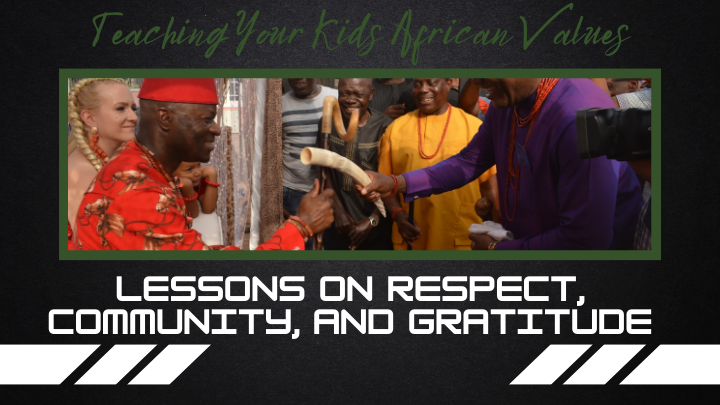Teaching Kids African Values
African cultures are rich in values that have been passed down through generations. These timeless principles of respect, community, and gratitude are deeply ingrained in African societies and have played a crucial role in shaping strong, cohesive communities. Teaching your children these values not only connects them to their cultural heritage but also helps them grow into compassionate, responsible, and respectful individuals. In a fast-paced world, where individualism often takes center stage, instilling African values in your children can create a strong foundation of emotional intelligence, social responsibility, and empathy.
Here’s how to teach your children key African values such as respect, community, and gratitude, and why these lessons are important for their development.
1. Instilling Respect: “Ubuntu” and Honor for Elders
Respect is at the heart of many African cultures, with elders often seen as the custodians of wisdom and tradition. One of the most fundamental values in African societies is the concept of Ubuntu, which translates to “I am because we are.” This philosophy highlights the interconnectedness of all people and stresses mutual respect and understanding.
How to Teach Respect to Your Kids:
- Teach About Elders: In many African cultures, elders are revered for their knowledge and experience. Encourage your children to respect elders by listening to their stories, asking for advice, and showing courtesy. Simple actions like greeting elders with respect (e.g., bowing, kneeling, or standing to greet) can be instilled as part of daily practice.
- Model Respectful Behavior: Children often learn by example. Be sure to demonstrate respectful behavior in your interactions with others, especially with elders, friends, and family. Practice active listening, empathy, and politeness at home.
- Teach Traditional Greetings: In many African cultures, greetings are more than just a formality—they’re an expression of respect. Teach your children traditional greetings in your native language and explain their significance. For example, in some cultures, it’s common to show respect by greeting with a handshake, bow, or specific gestures.
Why Respect is Important: Respect fosters harmony and strengthens relationships, ensuring that everyone feels valued and heard. By teaching your kids respect, you help them build strong relationships with others and create a sense of mutual understanding, both within the family and in broader society.
2. Fostering a Sense of Community: "It Takes a Village"
In many African cultures, the concept of community is paramount. Families often don’t just live independently; they are part of a larger support system that includes extended family, neighbors, and friends. The well-being of each individual is seen as interconnected with that of others, leading to a strong sense of collective responsibility.
How to Teach Community Values to Your Kids:
- Encourage Sharing and Helping Others: Teach your children the importance of sharing and helping those around them, whether it’s helping a sibling with homework or assisting a neighbor in need. In African culture, sharing resources—whether food, knowledge, or time—is seen as a natural and vital part of life.
- Get Involved in Local Communities: Show your kids the value of contributing to the community by participating in local events, volunteering, or supporting community initiatives. This involvement teaches them that they have a responsibility to care for others.
- Celebrate Family and Extended Relationships: In African cultures, the concept of family extends beyond the nuclear family. Teach your children the importance of maintaining strong relationships with extended family members, including grandparents, aunts, uncles, cousins, and family friends. Encourage them to participate in family gatherings, share experiences, and create memories with their broader community.
Why Community Matters: A strong sense of community provides children with a safety net of emotional and social support. It helps them feel valued, loved, and understood. In turn, they are more likely to develop a sense of responsibility and empathy, understanding that their actions affect not only themselves but the people around them.
3. Teaching Gratitude: Honoring Blessings and Appreciating Life
Gratitude is a cornerstone of African values. Many African cultures emphasize giving thanks for what one has, no matter how small or large. Whether it’s giving thanks to God, ancestors, or one’s community, gratitude is a way of acknowledging the blessings that life offers.
How to Teach Gratitude to Your Kids:
- Practice Daily Gratitude: Encourage your children to express gratitude every day. This could be through a “gratitude journal,” where they write down three things they are thankful for each day, or simply taking a moment at dinner to say something they are grateful for.
- Teach the Concept of “Thank You” in Context: Explain to your kids the importance of gratitude not just as a polite phrase, but as a way to acknowledge and honor what others have done for them. Teach them to say “thank you” with sincerity and to appreciate the small and big things in life.
- Incorporate African Blessings: Many African cultures have specific blessings or expressions of gratitude. Teach your children these sayings or phrases and explain their cultural significance. For example, in some African cultures, a common phrase to show thanks is “Asante sana” (Swahili for “Thank you very much”), and it’s often accompanied by a respectful gesture like a bow or hand gesture.
Why Gratitude is Important: Gratitude fosters contentment and reduces feelings of entitlement. By teaching your children to appreciate the gifts of life, both big and small, you help them develop a positive, humble outlook on life. Gratitude also enhances empathy, as children who are thankful tend to be more considerate of others' feelings and needs.
4. Using African Proverbs to Instill Wisdom and Character
African proverbs are a rich source of wisdom, often capturing profound truths in simple, poetic phrases. These proverbs offer timeless lessons about life, relationships, and personal growth.
How to Teach Wisdom Through Proverbs:
- Introduce African Proverbs: Share African proverbs with your children and discuss their meanings. Proverbs like “Wisdom is like a baobab tree; no one individual can embrace it” or “A single bracelet does not jingle” teach the value of teamwork, wisdom, and learning from others.
- Use Proverbs in Daily Life: When challenges arise, use proverbs to offer guidance. For example, when your child faces a difficult decision, you might say, “If you want to go fast, go alone; if you want to go far, go together.” This teaches the importance of collaboration and long-term thinking.
Why Proverbs Matter: Proverbs encapsulate valuable life lessons and can be used as tools for teaching kids about ethics, personal responsibility, and decision-making. They also promote critical thinking, as children reflect on the meaning and relevance of these timeless sayings.
Teaching your children African values such as respect, community, and gratitude can provide them with the tools to navigate the world with kindness, compassion, and responsibility. These values are not only essential in African cultures but are universal principles that help children build strong relationships, foster a sense of belonging, and cultivate an appreciation for the world around them. By instilling these values, you are not only preserving your cultural heritage but also shaping the future of the next generation with love, wisdom, and integrity.



